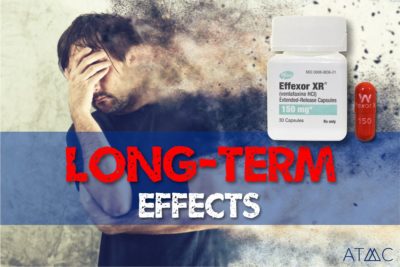Guidance for Effexor XR Discontinuation
Don’t try stopping Effexor XR on your own, and certainly not abruptly. Enlist the help of a trusted physician, or other qualified professionals to advise and monitor your progress. Some physicians are more informed than others on long-term Effexor XR effects and discontinuation methods.
Gradual Reduction: A conservative very gradual reduction is recommended over a minimum of 4 weeks, or better, some number of months. This will lower your risk of worsened depression and minimize the risk of complications that may otherwise occur. Research has shown that abrupt discontinuation compared to a 2-4 week long timeline are both very similar in their results. The higher the dose and the longer it was taken, the more difficult the discontinuation symptoms will likely be. The milder approach to mitigate long-term Effexor XR effects is the longer timeline.7,20,21
Timing: If Effexor XR is usually taken in the morning, continue that schedule. Do not suddenly switch to taking it before bed or randomly during waking hours.
Inpatient Care: Speak to your physician about inpatient care. For a person who is already in a fragile condition, this may be the best option to help you meet the challenges with adequate support. Often an outpatient setting may not be able to provide the level of care that is needed, especially after long-term Effexor XR effects have become chronic.
Methods of Effexor XR Discontinuation
Each case presents unique challenges. Some persons may be taking multiple medications. In this case, a program would need to be tailored to discontinue them in a sequence that is optimum for overall safety and comfort.
Because Effexor XR is encapsulated in a time-release outer coating, when you cut into it, the extended-release characteristic is lost. Using the smallest dose tablets or substituting with a similar drug such as desvenlafaxine, which has a longer half-life and a similar molecular structure, to configure the desired reduced dose may be useful. The immediate-release version of Effexor was replaced by Effexor XR in 1993. Drug makers explained that the extended-release formula lessened the severity of nausea associated with the earlier immediate-release version of venlafaxine. This may have an impact on tolerability if switching to a non-time-release version. Where discontinuation symptoms are intolerably harsh, the prescriber may opt to cross over to a similar drug that has a longer half-life, is more easily tolerated, or for other reasons. Specific dosing and timing changes should be carefully monitored and adjusted to make the transition tolerable.9,20
Dosage reductions must be small enough to tolerate and would need to be exactly and consistently measured. This is easier with the help of the physician or pharmacist to make sure the reductions are exact. Immediate release venlafaxine is also available in an oral suspension, that in some cases, may be useful but as aforementioned, may present challenges due to its immediate vs extended release characteristics. These are issues that must be discussed carefully with an informed prescriber before implementation.23,24
More details on these and other methods of Effexor XR discontinuation can be found on our antidepressant tapering and Effexor tapering pages. Alternative to Meds Center uses many support therapies such as therapeutic massage, acupuncture, targeted nutritional therapies, and many others, to ease any discomfort that may occur as the program progresses.
Targeted nutritional therapy is a fundamental pillar of our treatment protocols before, during, and after discontinuation. This provides the CNS and the entire body with the raw materials it needs for a robust recovery to resolve the set of symptoms that preceded drug use in the first place. As clients will learn much more about in the educational classes offered during their program, nutrition is key to recovery, including restoring a healthy and functioning gut microbiome. 25,26
Effexor XR Half-life
The half-life of a drug is an important factor to consider when designing a drug discontinuation program, as beyond this window of time is when discontinuation symptoms are likely to emerge. Effexor XR comprises 2 agents that suppress the uptake of serotonin, norepinephrine, and to a lesser extent, dopamine. These agents are venlafaxine, and O-desmethylvenlafaxine. Venlafaxine has a half-life of about 5 hours, and ODV has a half-life of about 10 hours. The half-life may shift in either direction because of various influences, for example, impaired liver, dysfunctional kidneys, and other factors related to fast or slow metabolism including potential interactions with other drugs.7
Symptoms of Effexor XR Discontinuation
The drug label lists a number of symptoms that may emerge especially after long-term Effexor XR effects have developed and recommends gradual cessation to mitigate these as much as possible. The list includes brain zaps, seizures, headache, confusion, worsening anxiety, worsening depression, dizziness, insomnia, hypomania, tinnitus, rapidly changing or exaggerated emotions such as aggression, rage, crying spells, and others. While not everyone will experience these, be alert to them and let your managing physician or careworker know if you experience discomfort or concern, so your cessation program can be better tailored to your comfort and safety.7,20-23
Alternative to Meds Specializes in Addressing Long-term Effexor XR Effects and Gentle Discontinuation
At Alternative to Meds Center, we specialize in the most challenging cases involving transitioning to drug-free living. Under the careful management of over 40 qualified caregivers and medical staff, we have helped thousands of clients attain successful treatment outcomes without relying on prescription medications. Please view our services page for more detailed information on the protocols that are used at Alternative to Meds Center to end unnecessary suffering, ease the transition from prescription medication, and achieve authentic recovery. We are here to help you resolve the long-term effects associated with Effexor XR safely, effectively, and comfortably.

 Drug-induced suicidality (suicidal thoughts) and attempted or completed suicide has been a controversial topic associated with antidepressant medications for decades. Some studies show a negative (not statistically significant) correlation and some studies show a definite correlation. The exact mechanism of antidepressant-induced suicidality has not been discovered. One theory is that where suicidality increased after initiating drug treatment the antidepressant may have increased energy and impulsivity, thereby an increased proclivity to act on suicidal thoughts.13 In some cases, the emergence of akathisia was associated with emerging suicidality and both adverse effects resolved after drug therapy was stopped.17 Another theory proposes antidepressant use worsened the level of depression, and that led to suicidal thoughts or a suicide attempt in the context of deepening hopelessness. This is often referred to as paradoxical depression, which lifts after the antidepressant is discontinued.16
Drug-induced suicidality (suicidal thoughts) and attempted or completed suicide has been a controversial topic associated with antidepressant medications for decades. Some studies show a negative (not statistically significant) correlation and some studies show a definite correlation. The exact mechanism of antidepressant-induced suicidality has not been discovered. One theory is that where suicidality increased after initiating drug treatment the antidepressant may have increased energy and impulsivity, thereby an increased proclivity to act on suicidal thoughts.13 In some cases, the emergence of akathisia was associated with emerging suicidality and both adverse effects resolved after drug therapy was stopped.17 Another theory proposes antidepressant use worsened the level of depression, and that led to suicidal thoughts or a suicide attempt in the context of deepening hopelessness. This is often referred to as paradoxical depression, which lifts after the antidepressant is discontinued.16







